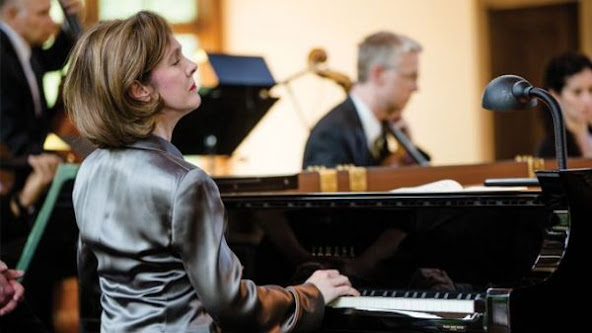Yesterday, I chanced upon a fascinating video on YouTube featuring an interview with Anne-Marie McDermott who I didn't previously know but who I probably should have known. She discusses the pulse that permeates Bach's music, and how a performer's rhythmic freedom (or rubato) necessitates a good control and a deep sense of the pulse in order to humanise her interpretation and convey the spirit of the music, rather than this rhythmic freedom being a means of self-indulgence or of merely personal expression.
As I was watching the video, I was awaiting her opinion of Glenn Gould who was featured in the video title. Until she belatedly got around to voice it, I had no idea whether she would claim to hate him of love him. (Most musicians either love or hate Gould. Very few are indifferent). I am not going to provide a spoiler here. Nevertheless, during the discussion leading up to that moment, I was reminded of an anecdote regarding rhythmic rigor that had been told by Gould himself: The contemporary composer Milton Babbitt, who was acquainted with Gould, had analysed performances of the same Bach piece recorded by several pianists in order to assess their rhythmic evenness by means of precise measurements. Gould, who's playing often conveys a sense of almost metronomic precision, and who is known to eschew the romantic piano repertoire that calls for much rubato, might have been expected to deviate the least from a constant beat. But Babbitt had found that, in all of his samples, it was Gould who deviated the most! This suggests to me that, as McDermott explained in the video, and as she also demonstrated on the piano, intelligent and expressive rhythmic deviation from a constant beat can highlight the pulse that animates a piece of music and hence may become totally inconspicuous. When done right, the rubato hides the intention of the musician who gives herself totally to the music. The freedom in the interpretation is the freedom to express what the music demands.
This may seem paradoxical. But the apparent paradox stems from the widespread idea that human freedom, or free will, is a matter of being free from all determinations including whatever might be demanded of oneself (or imposed on oneself) by habit, tradition, reason or duty. On my view, this idea is highly prejudiced. Freedom rather comes from our autonomous capacity to act or perform intelligently, or humanely, and this capacity can be enhanced, or scaffolded, by all of those constraining factors rather than being hindered by them. A truly autonomous agent also has the capacity to question the social norms or traditions that condition her activity, and to flout or reform them when they are found to be oppressive or obsolete, but freedom also finds expression in an ability to abide by existing norms intelligently (or ethically, or with artistic sensibility).
Another issue raised by McDermott concerns the reliance of the performer on her training. She points out that the honing of her skills, through diligent practice and repetition, enables the performer to focus on the present moment of the interpretation and gain conscious control of what is happening in this present moment. (I am paraphrasing a bit). I think that is true but one must also pay attention to the fact that the present moment of an artistic performance (as well as of most human actions) is thick and not instantaneous, as I had begun discussing in previous blog posts. The artistic choices that have been made previously, during the practice sessions, also unfold during the thick of the performance and provide the meaningful context for the individual notes and phrases, for the necessitated dynamic and rhythmic adjustments, etc. Here again, the constraints of the "thick present" on the instantaneous moments enable artistic freedom rather than impede it. They enable it though providing contextual meaning and significance to the elements of the performance.
I was also reminded of comments made by my novelist friend who decided to subject herself to the constraints inherent in producing a detective novel ("polar") as opposed to the free-form literature she was more experienced writing. She not only greatly enjoyed the experience, she also found freedom in it since the self-imposed constraints on the literary genre enabled her to shape up the characters of her novel rather than them being amorphously animated by their imagined whims. If I may suggest, the ongoing intrigue scaffolded the development of those characters and provided a pulse to the novel in rather the same way that the pulse in Bach's music ties up the melodic and harmonic elements of a piece in an organic and coherent fashion.

Comments
Post a Comment